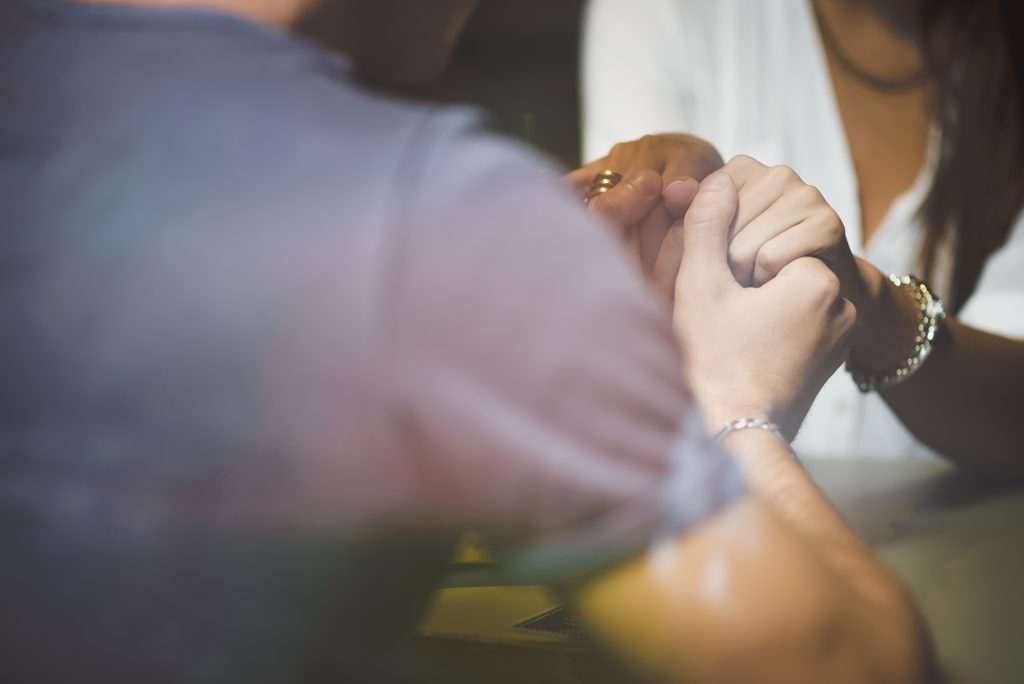
Why do we always fall for the same type?

Distant or social, artistic or down to business, flirtatious or serious. There are an infinite number of types you can fall for. But why do we tend to fall for the same type every time, even if it hasn’t necessarily led to great results in the past? We take a closer look at the science behind these persistent relationship patterns!
From artist to CEO
Attraction is a mysterious phenomenon. Some women might date a sleazy artist type one day, only to be swooning away in a fancy restaurant with the CEO of a tech company a few months later. Other women have a string of exes and one-night stands that are all suspiciously similar.
When we say we like a certain type, we probably immediately think of specific physical characteristics or positive character traits: dark hair and blue eyes, a social and cheerful character. I mean, who wouldn’t want that? But if we take an honest look at our dating history, many women conclude that they have often felt a spark for men who they knew were bad news.
Pattern discovery
Sometimes, we even get stuck in a destructive pattern that we’re tricked by time and again and date men who make us miserable. With litres of wine and tonnes of chocolate, we cry out to our sighing girlfriends, who, of course, had already seen this tearful outcome coming from miles away.
Unfortunately, we don’t always realise why we’re attracted to types who are absolutely not good for us. That’s why we firmly resolve never to get involved with someone like our ex again…. until the next one shows up. After a few months, we feel desperate and wonder why we always end up in such a worthless relationship disaster.
Well, one day, we have to make a sensible choice, don’t we? With a stable, loving person with whom we can simply be happy.
Research shows: we often choose the same type
Changing our patterns is easier said than done. For example, research by Yoobin Park and Geoff MacDonald shows that our exes and new partners often have more in common than we have with them. Apparently, we feel attracted to a certain type over and over again and find it hard to break that pattern, even when it gets in the way of our happiness.
For their study, the scientists examined the personalities of exes and current partners of 332 participants for nine years. First, the participants had to assess their own personality by answering 21 statements. These statements revolved around the Big Five personality theory, which divides people into five personality types:
- Extravert: How social, assertive, and adventurous are you?
- Compassionate: how warm, generous, and empathetic are you?
- Careful: how practical, organized, and responsible are you?
- Neurotic: how anxious, insecure, and emotionally unstable are you?
- Being open to new experiences: how creative and intellectual are you?
Using statements such as ‘I am modest and reserved’ and ‘I am interested in many different things’, the participants were eventually assigned to a particular personality type. The participants’ exes and current partners also completed the questionnaires.

Neurotic types have more relationship problems
The results were striking. We might think that opposites attract, but the study didn’t show that at all. The participants appeared to have chosen partners with similar personality traits. Even more striking was that the participants’ current and previous partners described themselves in the same way. Moreover, the similarities between new partners and exes of participants were greater than those between new partners and participants.
Another question Park and MacDonald investigated was whether some people were more prone to a particular type than others. They discovered that people who scored high on neuroticism and were therefore sombre and anxious in nature more often had to contend with conflicts within their relationships. They also ended up more often with partners who were actually not their type or who did not resemble them. The researchers did not give a real explanation, except for the suggestion that neurotic people have a smaller pool to fish from due to their complex personalities. Finding a suitable partner is therefore much less obvious for them.
On the other hand, it turned out that people with an extraverted personality were much less likely to fall for someone who resembled their ex. The researchers suggested that this is because these people are much more open to different types and have a larger and more diverse social network.
Why do we often fall for the same type?
But what lies behind the patterns that cause us to continuously date the same type? The research showed that we often end up with the same types, but not why.
One possibility is that it’s more about a certain type of person falling for us. Imagine that you’re an emotionally stable type. People who are more unstable in life may be attracted to your calm and no-nonsense personality. Or you’re very easy-going and don’t feel the need to impose your will on others or to put up a fight. In that case, you may have the perfect personality for a dominant go-getter, someone who likes to pull the strings.
That doesn’t mean you’re necessarily looking for a controlling type, but these types may just be attracted to you. It also doesn’t mean that these relationships are destined to fail. Perhaps you like the balance yourself as well and you both benefit from it. Or maybe you’ve learned the hard way and now know how to handle certain relationship patterns. For example, Park points out that in every relationship, you learn strategies for dealing with your partner’s personality. If your new partner’s personality is similar to your ex’s, it can make a lot of sense to put those learned strategies into practice in your new relationship. A fresh, new start.
Defence mechanisms
But what if falling for the same type means that you end up struggling with the same unhealthy relationship patterns over and over again? If you always fall for inflated egos with a fear of commitment, for example? Or if you always run away screaming when your new lover threatens to put his toothbrush in your bathroom cabinet? To understand why dysfunctional relationships attract us, we need to understand how attraction works. And where it comes from deep inside.
According to Lisa Firestone, many people choose partners who fit in with their own defence mechanisms. Quiet, withdrawn people more often choose aggressive, extraverted partners. And insecure, affectionate types more often fall for partners who are distant or less available: people they have to chase.
Mimicking relationship patterns
The reason we stay stuck in such a toxic dynamic? According to Firestone, it often lies in our earliest relationships. As children, we developed defence mechanisms to deal with painful experiences, such as rejection or criticism. Over the years, we become so accustomed to these defences that we begin to see them as part of ourselves. So those early relationship patterns have become a model for future relationships.
Were you neglected as a child or did you feel like you weren’t seen? Then you might think you’ve been falling for reserved, mysterious men because they seem so deep and interesting, but secretly you’re falling for them because they are emotionally distant. And because they can never give themselves fully to you.
In fact, in this way, we mimic the painful relationship patterns of our childhood. If we were ignored as a child, we later become attracted to people who don’t want to commit. And if we had to take care of everyone in the family as a child, we now look for unstable partners to rescue. We’re attracted to the familiar and trusted feelings that these relationships stir up, even if the feelings themselves are nasty and negative. Some experts say that this is how we try to heal old wounds.
Are we doomed to always fall for the same type?
Does this mean we’re destined to repeat the same destructive relationship patterns endlessly? Certainly not, says relationship expert Francesca Hogi. We can change our type, as long as we learn to recognise these patterns. And that means consciously asking ourselves which negative traits we are attracted to.
Think about the people you’ve had relationships with and note the recurring patterns. How did they treat you? What character traits did they seem to be looking for? Did they want you to be dominant in the relationship? Or did they back off as soon as you got too close? Were they bold in their attempts at seduction, or did they seem uninterested at first, leaving you hopelessly hooked?
Healthier choices
Draw connections to your past as well. Do these relationship patterns feel familiar? Do they remind you of something or someone from your childhood? When we recognise our relationship patterns, we have the opportunity to make new choices. And to find partners who challenge our defence mechanisms and dare to make a healthier, safer, longer lasting commitment.
Maybe you keep a soft spot for sultry, mysterious loners. And perhaps your heart will continue to leap at a cheerful party animal or a serious tailored suit. There’s nothing wrong with that. As long as these patterns themselves evolve, so that you finally find yourself back in a healthy, viable relationship.
One sleazy artist is not the other, after all. Just as one CEO cannot be compared to another. What matters is that you break through negative relationship patterns. Are you someone who flees in panic when a romantic lover threatens to get too close? Then try to trust him for a change. Who knows what kind of beauty will blossom when you dare to throw old patterns aside!








Respond or ask a question
0 comments